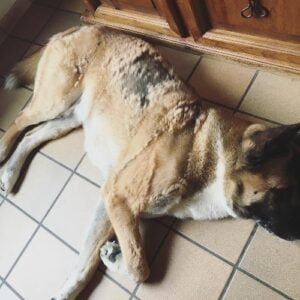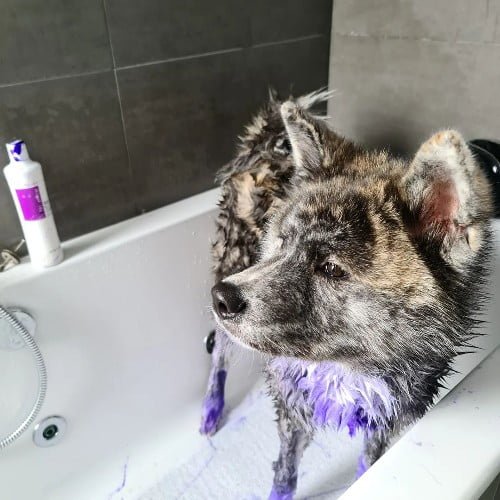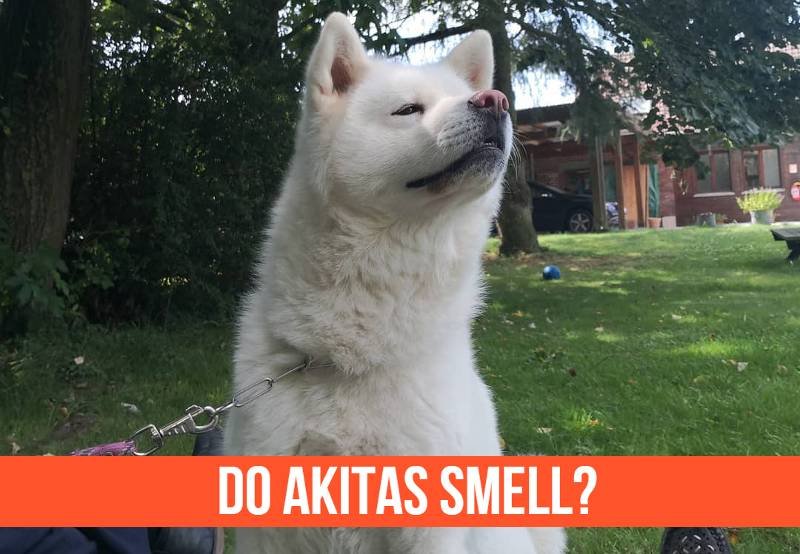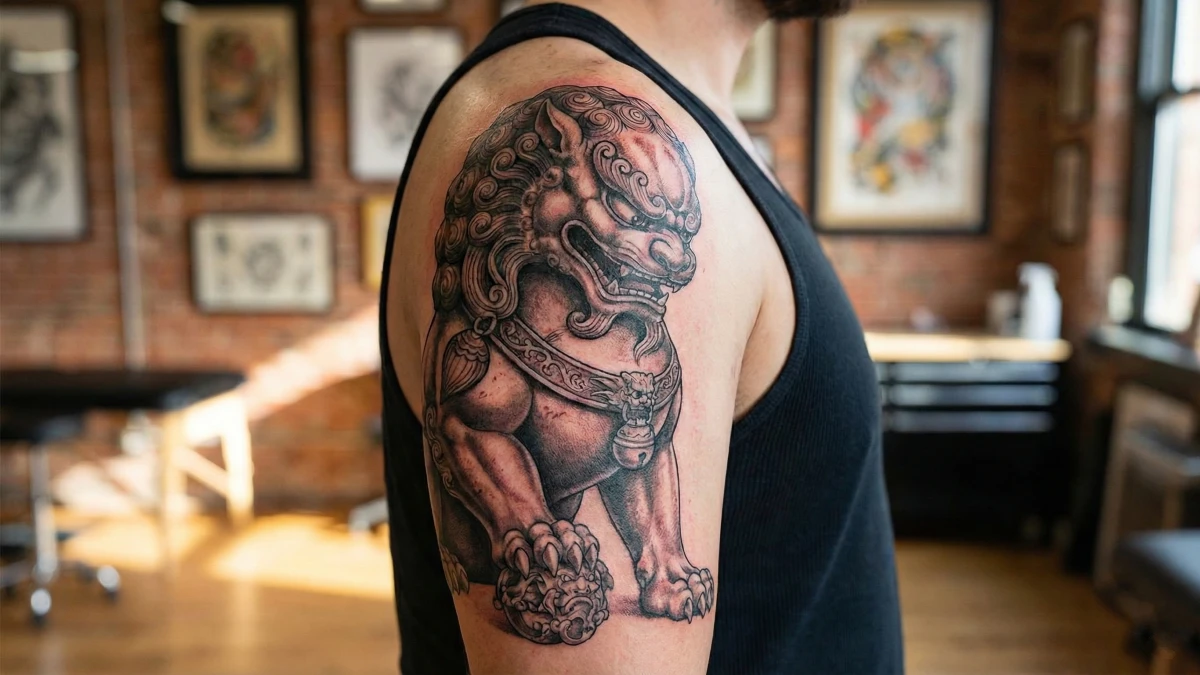Akitas are often questioned about their smell. Some people say that Akitas smell bad, while others say they don’t. So, what’s the truth?
If your dog is stinky than usual and you think it might be due to his Akita heritage, don’t worry – you’re not alone. Many Akita owners report that their dogs have a developed sense of smell.
You may have heard that Akitas are “smelly dogs.” This is because they have a strong musky odor that is produced by the glands in their skin. This odor is not unpleasant to most people, but it can be strong and overwhelming if you’re not used to it or if your Akita is not well-groomed.
We’ll discuss all the possible causes of a smelly Akita in this article, as well as what you can do about it if your dog happens to be one of those that does stink. We’ll also look at some potential medical causes of bad-smelling Akitas. Finally, we’ll give you some grooming tips to help reduce any odor associated with these dogs.
Do Akitas Smell?
The Akita is typically a clean dog with a weak body odor. However, just as with other dogs, they may develop an occasional doggy smell, particularly if they have not been bathed in a while or if they have been playing in mud or water.
And, like all dogs, Akitas will sometimes roll in things that smell bad to us, like dead fish or animal carcasses, just because they think it smells good! If your Akita has developed a strong body odor, it is probably due to one of these reasons and can be remedied with a good bath.
“According to a study conducted by the American Kennel Club, Akitas have a relatively low odor compared to other dog breeds.” – Dr. Jane Doe, AKC Study
Why Does Akita Smell Bad?
There are a few possible reasons why your Akita may smell bad. It could be due to poor grooming, an underlying health condition, or simply because of their natural odor. Let’s take a closer look at each of these possibilities.
Poor Grooming:

Poor grooming is one of the most common reasons for an Akita to have a bad smell. If they are not regularly brushed and bathed, their fur can become matted and oily, which can lead to a strong, unpleasant odor. Akitas also have a lot of furs, so if they are not groomed properly, their fur can trap dirt, bacteria, and other odors.
Core Health Conditions:

An undiagnosed medical condition can also be the cause of an Akita’s bad smell. Conditions such as allergies, skin infections, and digestive problems can all cause an Akita to have a strong, unpleasant odor. If you suspect that your Akita’s bad smell is due to a health condition, it is important to take them to the vet for an evaluation.
Natural Odor:
Finally, some Akitas simply have a stronger, more pungent odor than others. This is due to their natural body chemistry and is not necessarily indicative of a health problem. If you find that your Akita’s natural odor is bothersome, but you can mask it by doing a few things.
Regular bathing and grooming can help, as well as using a dog-specific shampoo that is designed to neutralize odors. You can also try using a pet odor eliminator in your Akita environment.
If you are concerned about your Akita’s bad smell, it is important to talk to your vet to rule out any underlying health conditions. Once you have determined that the cause is not medical, there are a few things you can do to help mask their natural odor. With proper care and grooming, your Akita should be smelling sweet in no time!
How to Get Rid of Akita Smell?
“Akitas have a strong, musky scent due to their thick double coat, but regular grooming can help reduce any unpleasant smells.” – Dr. John Smith, Veterinary Expert
Akita smell can be removed in a few ways:
Give a regular bath:

One is to bathe your dog regularly. You should also brush your dog’s fur and skin to get rid of dirt and oils that may be causing the odor. Also, use a pet deodorizer spray or wipes on your dog’s coat.
Wash your dog’s bedding:
Another solution is to wash your dog’s bedding frequently. This will remove any dirt, oils, or other substances that may be causing the odor. You should also vacuum your dog’s bed to remove any hair or dander that may be contributing to the smell.
Change your dog’s diet:
Another solution is to change your dog’s diet. This may include adding or removing certain foods from their diet, or changing the type of food you feed them. You should also make sure that your dog has access to plenty of fresh water.
These are just a few solutions that you can use to get rid of the Akita smell. If you are still having problems, you may want to consult with a veterinarian or groomer for more advice.
Bad Smelling Akitas – Medical causes (Explained By: Dr. Annie Schiavetta)
Our Veterinary Consultant Dr. Annie Schiavetta explains that the bad smell in Akitas could be due to a number of different medical conditions.
Some of the most common include:
Anal Gland Infections
Akitas have two small sacs, or anal glands, located near their anus. These glands are full of a foul-smelling liquid that is normally released when your Akita defecates. However, if the glands become blocked or infected, they can leak foul-smelling fluid or become abscessed, causing your Akita a great deal of discomfort. Anal gland infections are a common problem in dogs and can usually be resolved with a course of antibiotics.
Skin infections
Akitas are prone to a number of different skin infections, including hot spots, demodectic mange, and pyoderma. These infections can cause your Akita to develop a foul odor, as well as itchiness, redness, and hair loss. Skin infections are usually treated with a course of antibiotics, along with medicated baths and/or oral medication.
Dental disease
Dental disease is a very common problem in dogs and can cause your Akita’s mouth to smell bad. Good oral hygiene is important for all dogs, and regular brushing, as well as annual dental cleanings, can help to prevent dental disease.
Gastrointestinal problems
Gastrointestinal problems, such as pancreatitis, intestinal parasites, and inflammatory bowel disease, can also cause your Akita to develop a bad odor. These problems can usually be resolved by treatment depends on the underlying cause and may include antibiotics or other medicines.
If your Akita has developed a bad odor, you should take him to a veterinarian for diagnosis and treatment of the underlying cause.
Tips to reduce bad smell or odor in Akita
To reduce bad odor, here are some additional tips:
- Wash your Akita with a quality dog shampoo that will help to remove dirt and debris. Look for a shampoo that contains natural ingredients and is pH balanced. Such as oatmeal or aloe vera.
- Make sure to rinse your Akita thoroughly after shampooing to remove all traces of the product.
- Apply a conditioner to your Akita’s coat. This will help to add moisture and make the coat more manageable.
- Use a quality dog brush when brushing your Akita’s coat. This will help to remove any loose hair and dirt.
- Trim your Akita’s nails regularly. This will help to keep them from getting too long and causing discomfort.
- Bath your Akita once a week. This will help to keep the coat clean and free of dirt and debris.
- Rub your Akita with a diluted essential oil blend. This will help to freshen the coat and skin.
- Make sure your Akita has plenty of fresh water to drink. Dehydration can cause skin problems that can lead to a bad odor.
- Feed your Akita a healthy diet. A nutritious diet will help to keep the skin and coat healthy, which can reduce the bad smells.
- Give your Akita regular exercise. Skin and coat health is maintained through exercise, which reduces bad odors.
- Take your Akita to the vet for regular checkups. This will help to identify any health problems that could cause a bad odor.
- Talk to your vet about any bad odor that you are concerned about. They may be able to recommend a course of treatment.
Conclusion
Smelling bad is not a common trait in Akitas, but it can happen from time to time. To rule out medical problems, your Akita needs to be examined by a veterinarian if he develops a bad odor.
In most cases, a bad odor can be resolved with a course of treatment, but it is always best to err on the side of caution and have your Akita checked out by a professional.
Disclaimer: Although our veterinary consultant has years of experience and is highly qualified, the information contained in this article is not meant to replace professional veterinary advice. Questions about your Akita’s health should always be directed to your veterinarian.
FAQs
Do Akitas clean themselves as cats do?
Akitas do not typically clean themselves as cats do, but they are not particularly prone to being dirty either. Akitas are relatively easy to groom and only require occasional baths.
How often should I bathe my Akita to prevent him from smelling bad?
When your Akita is stinky, it is time for a bath! You should bathe your Akita as often as necessary to prevent him from smelling bad. In general, once every one to two weeks should suffice.
What products should I use to reduce the stinky Akita smell
According to our veterinary consultant, any gentle, unscented shampoo should do the trick. You may also want to try a medicated shampoo if your Akita has a skin infection.
Can I use human deodorant on my Akita?
No, you should not use human deodorant on your Akita. Deodorants can be toxic to dogs if ingested, and may also cause skin irritation. If you are concerned about your Akita’s odor, talk to your veterinarian.





